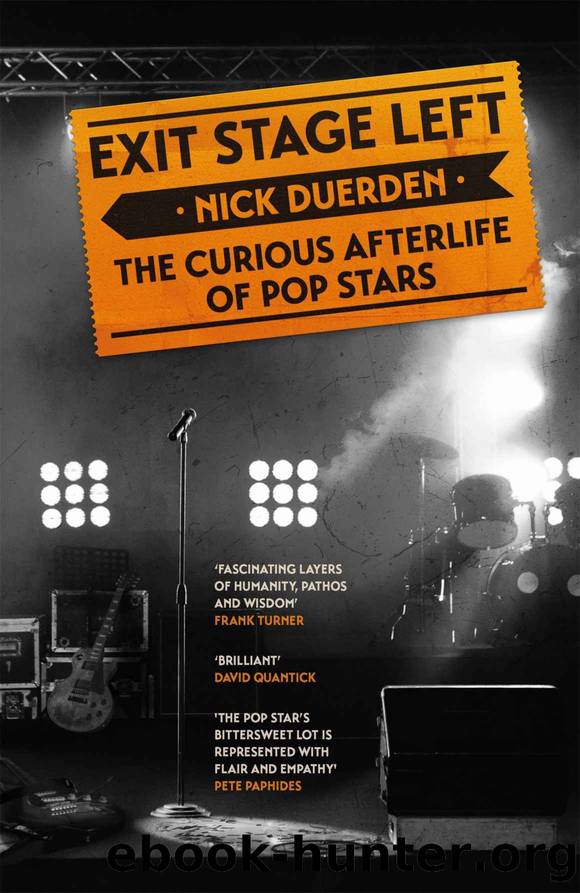Exit Stage Left by Nick Duerden

Author:Nick Duerden [Duerden, Nick]
Language: eng
Format: epub
ISBN: 9781472277794
Publisher: Headline
Published: 2022-04-28T05:00:00+00:00
17
âI love the upheaval; I love emotional disasters; I love mismanaging every relationship Iâve ever hadâ
Despite those few exceptions that prove the rule, there cannot be too many long-term prospects for the kind of rock star who finds their niche wearing the sort of spandex most people would flinch from on the grounds of taste, decency and functional eyesight. And so, if there ever was a genre for which the advice âenjoy it while it lastsâ was designed, itâs hair metal. Hair metal has a long, complicated, and often hilarious, past, and was mostly left dead and buried by two things, both of which occurred within the space of a week in late September 1991: the implosion of Guns Nâ Roses into the worldâs most bloatedly humourless rock band with the release of Use Your Illusion I; and the main stage arrival of Nirvana with their second album, Nevermind. The latterâs pared-down economy was so throat-grippingly effective it compelled all remaining hair metal outfits to please make their way to the door marked EXIT in a disorderly fashion.
It seemed that the genre was never going to attempt a return until, somehow, in the early 2000s, it did. Its resurrection came from an unlikely location: Lowestoft, an English coastal town 110 miles from London. The band were called the Darkness, and were proponents of the genre with the kind of tongue-in-cheek cheek that many would suggest could only ever have been the product of sardonic Brits. Itâs entirely possible that a band never took itself less seriously than the Darkness, but as is always the way with comedy, the bandâs collective efforts to raise a smile, and to entertain, served to mask just how adept they were at what they did â skilled, even.
Regardless, theyâd have been wise to enjoy it while it lasted, too.
The Darkness converged at the purely imaginary point at which Queenâs Freddie Mercury careened into Aerosmithâs Steven Tyler and Spinal Tapâs David St Hubbins outside the portaloos at a Monsters of Rock festival, each looking the other up and down and wondering who was taking the piss more. In the video for their 2003 signature tune âI Believe in a Thing Called Loveâ, they knowingly plundered every caricature of every bad hair metal and rock act thereâd ever been: Lycra jumpsuits opened to the navel, long hair, tattoos and handlebar moustaches. But where so much of this sort of thing invariably involved more style than content, âI Believe in a Thing Called Loveâ was determinedly joyful, the most fun pop song in an age.
âThat takes a certain amount of charisma, you know,â says singer Justin Hawkins on playing the role of a frontman who stands on stage with legs akimbo and one arm held high, convinced heâs in full command of his audience. Fortunately for him, Hawkins was possessed with that charisma. Heâd grown up wanting to be Freddie Mercury all along, and as an avid teenage gig-goer would note with interest just how few frontmen could manage what Queenâs singer so effortlessly could.
Download
This site does not store any files on its server. We only index and link to content provided by other sites. Please contact the content providers to delete copyright contents if any and email us, we'll remove relevant links or contents immediately.
| Biographies | Business |
| History & Criticism | Instruments |
| Musical Genres | Recording & Sound |
| Reference | Songbooks |
| Theory, Composition & Performance |
The Goal (Off-Campus #4) by Elle Kennedy(13673)
Kathy Andrews Collection by Kathy Andrews(11831)
Diary of a Player by Brad Paisley(7577)
Assassin’s Fate by Robin Hobb(6216)
What Does This Button Do? by Bruce Dickinson(6207)
Big Little Lies by Liane Moriarty(5804)
Altered Sensations by David Pantalony(5103)
Pale Blue Dot by Carl Sagan(5007)
Sticky Fingers by Joe Hagan(4198)
The Death of the Heart by Elizabeth Bowen(3621)
The Heroin Diaries by Nikki Sixx(3550)
Confessions of a Video Vixen by Karrine Steffans(3308)
Beneath These Shadows by Meghan March(3307)
How Music Works by David Byrne(3270)
The Help by Kathryn Stockett(3147)
Jam by Jam (epub)(3091)
Harry Potter 4 - Harry Potter and The Goblet of Fire by J.K.Rowling(3073)
Computational Linguistics and Intelligent Text Processing: 20th International Conference, CICLing 2019 La Rochelle, France, April 7â13, 2019 Revised Selected Papers, Part I by Alexander Gelbukh(2995)
Strange Fascination: David Bowie: The Definitive Story by David Buckley(2872)
